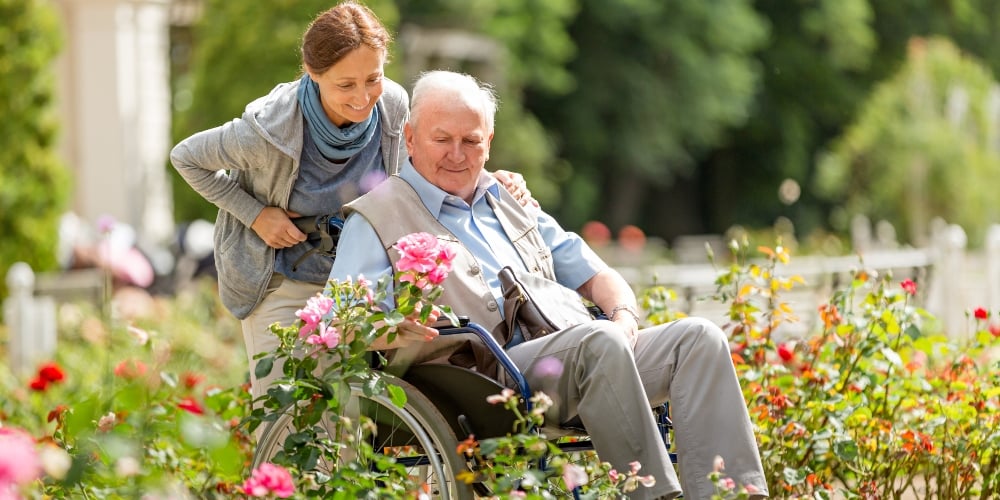
Sundown syndrome, also known as sundowning, is a common struggle for those with dementia, memory loss, or other cognitive disorders. Sundowning occurs in the late afternoon, evening, or at night. If you’re a caregiver for a loved one living with dementia and if your loved one is experiencing sundowning, you’re both likely exhausted. So, what’s the best way to cope?
A Closer Look at ‘Sundowning’
Sundowning, or late-day confusion, is a set of symptoms that affect people with dementia. It might look like increased restlessness (i.e., pacing) and confusion that starts as daylight begins to fade as well as problems sleeping.
According to the Alzheimer’s Association, there are many factors that may make it hard for people with dementia to fall asleep and stay in bed:
- Fatigue
- Disruption of the body’s “internal clock”
- Boredom
- Misinterpretations of surroundings due to lower lighting or shadows
- Difficulty separating reality from dreams
- Reactions to nonverbal cues from tired caregivers
Although there are medications used in the treatment of sundowning, some approaches to caring for someone experiencing sundowning can decrease the amount of medication needed or alleviate it altogether. That’s where person-centered care comes in.
What Is Person-centered Memory Care?
First introduced in the late 1980s and championed by internationally recognized dementia practitioner, educator, and founder of the Positive Approach to Care Teepa Snow, the person-centered approach to care is the adoption of a positive approach to caring for those with dementia and memory loss.
“Person-centered memory care looks at each person as a whole, not just the disease they suffer from, and not what they are unable to do but who they are and what they are capable of,” says Mandy Ketcham, Community Relations Coordinator at Highgate at Yakima and a certified trainer for both Positive Approach to Care and Virtual Dementia Training. “This is effective because each person, no matter if we have dementia or not, wants to be heard and listened to. Each of us doesn’t want to be labeled by what we can’t do but remembered for who we are.”
In the traditional “medical model,” caregivers view safety and health care issues as the top priorities. The approach is driven by the belief that the patient is sick and needs care for their diagnosis. This model isn’t a bad model, and it’s where most people start after a memory loss diagnosis. But the traditional model only addresses part of the challenges someone with dementia faces. Dementia affects the whole person — mind, body, and spirit. So addressing the physical aspect of sundowning is only one piece of the puzzle.
To learn more about how person-centered care differs from the traditional approach to dementia care and the benefits of person-centered care, download our eBook Person-centered Care: A Positive Approach to Caring for Those with Dementia and Memory Loss.
How Person-centered Care Can Reduce Sundowning
The person-centered approach emphasizes that there is more to people than just the disease and that social, mental, emotional, and spiritual needs are just as important as physical and medical needs. Everything in the person-centered approach model depends on personal preferences, values, personality traits, and the individual’s life story.
Here are five person-centered tips Ketcham recommends to family caregivers coping with sundowning.
1. Acknowledge Their Emotion
“I always say, ‘Dance their dance,’” Ketcham says. “So if your loved one is upset or having a ‘behavior,’ then mimic their emotion to validate what they are feeling. So if you walk into a room and your loved one has their hands on their hip and is pacing, then you do the same thing. If they try to tell you what is going on, and it doesn’t make any sense to you, then repeat back to them what they just told you.
“There will come a moment when you can look them in the eye or be right by them — that is when you need to take a deep breath,” Ketcham continues. “What happens when someone is upset is we constrict oxygen and blood to our brain. But when we breathe with our whole body, then we are allowing our brain to get the oxygen and blood that it needs to take in information and lower our stress. At this time, you can then say something like, “I need some help with …” or, “You know what sounds good right now … a cup of tea.”
2. Engage Your Loved One in a Purposeful Activity
“If you would like to minimize sundowning, I would suggest keeping your loved one busy with purposeful activities, like cleaning, baking, folding clothes, or gardening,” Ketcham says. “For example, our Life Enhancement Team is amazing at keeping our resident’s busy with purposeful activities, like volunteering with a new resident, showing them how an activity is done, helping out with folding napkins, making a shopping list for the store, singing, and many more activities. We also go for rides at 3:30 p.m. and when we get back, we are ready for dinner. This allows for each resident to continue the day with purpose.”
“These activities are more appropriate than giving an as-needed medication to control behaviors, which is what many doctors prescribe and communities give,” Ketcham continues. “Medications that are used to decrease behaviors can have side effects like sleepiness, falls, increased behaviors, and much more.”
Creating a daily routine can be helpful for both you and your loved one. This Physical Activity Planner will help you spend less time trying to figure out what to do and more time on activities that will improve your loved one’s overall well-being.
3. Reminisce
People with dementia can often remember the distant past more easily than recent events, so activities focusing on reminiscing can help improve mood and well-being.
“But never say, ‘Do you remember when ...,’” Ketcham advises. Instead of asking them to try to remember things, you might say something like, “I love that shirt on you! Purple has always looked really good on you. What is your favorite color? Mine is yellow, and yours is …?”
“You can say, ‘I remember when I used to …’, or, ‘I love vanilla ice cream. You love …?”
4. Sing
Although changes in memory make it hard to follow activities with multiple steps or instructions, musical ability tends to be very well retained. There are many ways to enjoy music — from singing and listening to following the rhythm and moving to the music — and research shows music has therapeutic and mood-boosting benefits. Try playing your loved one’s favorite songs or pieces of music, which can also be powerful prompts for reminiscence.
5. Pray
If your loved one has a spiritual practice, doing simple prayer activities can offer them peace, encouragement, and strength of prayer. If you can create a way for your loved one to do something concrete to participate in prayer, even better. For example, using familiar church prayers is a good way of praying with people living with dementia. And don’t overlook childhood prayers, such as “Now I lay me down to sleep.”
For more tips for family caregivers, subscribe to our newsletter. You’ll gain priority access to the most recent Aging Wisely blog articles as well as helpful resources and checklists.







